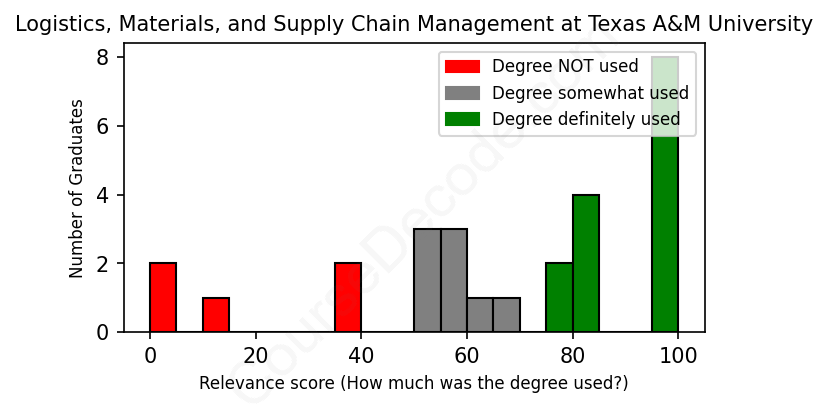
First, some facts. Of the Logistics, Materials, and Supply Chain Management graduates from Texas A&M University we've analyzed , here's how many have used (or NOT used) their degree in their career:

These are estimates based on AI analysis of 27 LinkedIn profiles (see below).
The verdict? On par with the average. Overall, with an average relevance score of 67%, Logistics, Materials, and Supply Chain Management graduates from Texas A&M University have about the same likelihood of finding work in this field as the average graduate across all fields:
And for comparison, here's the chart for all profiles we've looked at across all degrees.
Also, after graduating, only 25% of these graduates have pursued further education other than another Bachelor's degree (such as a Masters degree or other), compared to the average across all profiles of 35%. This suggests a Bachelors degree is enough for most Logistics, Materials, and Supply Chain Management graduates, and it's normal to look for work straight after graduation.
See the details:
|
Relevance score: 78% We think this person has gone into a career highly relevant to their degree. We think this person has gone into a career highly relevant to their degree.
DEGREE INFOGraduated in 2018 from Texas A&M University with a Bachelor of Business Administration - BBA in Logistics, Materials, and Supply Chain Management. No other secondary education since. JOB HISTORY SINCE GRADUATIONData Analytics Intern Southwest Airlines May 2018 - Aug 2018 Associate Business Analyst  Southwest Airlines Aug 2018 - Nov 2021 Technology Analyst  Southwest Airlines Nov 2021 - Present ABOUTNo information provided. |
The top 10 most common jobs done by the graduates we've analyzed (ranked most common to least) are:
After looking at all the job titles and descriptions from LinkedIn profiles of Texas A&M graduates with degrees in Logistics, Materials, and Supply Chain Management, it’s clear that many of them have snagged roles that are pretty relevant to what they studied. A lot of the common positions involve tasks like supply chain management, inventory control, and operations analysis. For instance, roles such as Replenishment Analyst, Supply Chain Specialist, and Logistics Coordinator appear frequently, showcasing direct applications of their academic knowledge. These jobs generally require the skills and concepts that are central to their degree, meaning most graduates are indeed working within relevant fields.
However, there are also quite a few graduates who have ventured into roles that either don’t fully utilize their logistics education or are only tangentially related. For example, jobs in sales, customer service, or roles like Academic Advisor don’t really hit on logistics or supply chain management aspects. While it’s great that they have diverse opportunities, not all of them tie back to their specialized training, which might suggest that graduates might want to seek more related positions as they progress in their careers. Overall, it looks like many graduates are able to find meaningful work in their field, but there’s also a mix of paths that stray away from the direct application of their degree.
Here is a visual representation of the most common words in job titles for Logistics, Materials, and Supply Chain Management graduates (this is across all Logistics, Materials, and Supply Chain Management graduates we've analyzed, not just those who went to Texas A&M University):

Graduates from Texas A&M University who studied Logistics, Materials, and Supply Chain Management seem to have pretty solid career trajectories. Typically, right after graduating, many have landed roles in areas like supply chain management, operations, or procurement. Their first jobs often involve critical operational tasks, such as replenishment analysis, inventory management, or even internships that set the groundwork for their careers. For instance, graduates from the early 2010s often started as analysts or in buyer roles and progressed to positions like project managers or sales managers within a few years. This shows a relevant alignment with their field of study and indicates that they’re quite active in the logistics industry right out of school.
As time goes on, like five or ten years down the line, it’s common to see these individuals taking on senior roles, such as supply chain planners or managers, and even pivoting into specialized areas like regulatory compliance or procurement data analysis. Many are working for major companies or leading organizations within the logistics space, hinting at healthy career growth. However, a few have ventured into unrelated fields or switched to roles that aren't exactly aligned with logistics, highlighting that while many have found success in their careers, there’s still a mix of paths taken. Overall, it seems graduates from this program are generally thriving in careers connected to logistics and supply chain management, which is promising for those thinking about this degree at Texas A&M!
Honestly, a Bachelor’s degree in Logistics, Materials, and Supply Chain Management can be a bit of a mixed bag, and how hard it is really depends on your strengths and interests. At Texas A&M, it's generally seen as a solid program, but like any business degree, it involves a good chunk of math, analytics, and understanding complex systems. If you're someone who enjoys problem-solving and working with data, you might find it pretty manageable, but if math isn't your jam, you could find it challenging. Overall, I’d say it falls somewhere around the average level of difficulty for a college degree—definitely not a walk in the park, but not the hardest thing out there either!
Most commonly, in the LinkedIn profiles we've looked at, it takes people 4 years to finish a Bachelor degree in Logistics, Materials, and Supply Chain Management.
Looking at the job history of these Texas A&M grads in Logistics, Materials, and Supply Chain Management, it seems like many of them have found a decent path, and in general, it looks like they’re doing pretty well financially. A lot of them started out in entry-level roles, like Analysts and Interns, but as they gained experience, many moved up to more senior and managerial positions. Companies like Lockheed Martin, Sysco, and Amazon are known for offering good salaries and benefits, so those who landed roles there likely did pretty well. It's also cool to see some grads even starting their own ventures or co-founding businesses, which shows potential for higher earnings down the line. So, overall, it looks like these folks are on a solid financial trajectory, especially compared to many other fields!
Here is a visual representation of the most common words seen in the "about" section of LinkedIn profiles who have a Bachelor degree in Logistics, Materials, and Supply Chain Management (this is across all Logistics, Materials, and Supply Chain Management graduates we've analyzed, not just those who went to Texas A&M University). This may or may not be useful:

Here are all colleges offering a Bachelor degree in Logistics, Materials, and Supply Chain Management (ordered by the average relevance score of their Logistics, Materials, and Supply Chain Management graduates, best to worst) where we have analyzed at least 10 of their graduates:
| College | Score | Count |
|---|---|---|
 Michigan State University Michigan State University
|
84 | 23 |
 Auburn University Auburn University
|
83 | 19 |
 Ashford University Ashford University
|
82 | 12 |
 University of Wisconsin-Milwaukee University of Wisconsin-Milwaukee
|
81 | 10 |
 Rutgers Business School Rutgers Business School
|
79 | 24 |
 Penn State University Penn State University
|
78 | 21 |
 Embry-Riddle Aeronautical University Embry-Riddle Aeronautical University
|
78 | 10 |
 Arizona State University - W. P. Carey School of Business Arizona State University - W. P. Carey School of Business
|
78 | 14 |
 Iowa State University Iowa State University
|
77 | 14 |
 University of Houston University of Houston
|
76 | 30 |
 University of Arkansas University of Arkansas
|
76 | 18 |
 University of Tennessee, Knoxville University of Tennessee, Knoxville
|
75 | 15 |
 University of North Texas University of North Texas
|
69 | 14 |
 Texas A&M University Texas A&M University
|
67 | 27 |
 Georgia Southern University Georgia Southern University
|
62 | 13 |
 The Ohio State University The Ohio State University
|
60 | 10 |
 University of Houston-Downtown University of Houston-Downtown
|
57 | 13 |